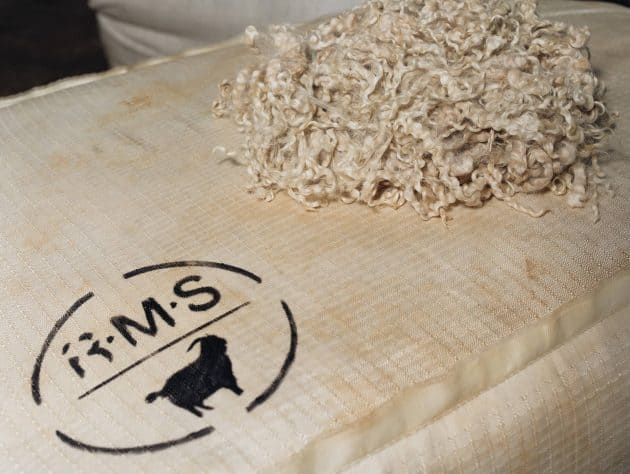Explained: What new EU sustainability policies mean for the industry and Textile Exchange’s standards

The European Union has put in place a broad range of environmental legislative initiatives that will directly impact the textile, fashion, and apparel industry. In this article, we take a closer look at the Empowering Consumers Directive, Green Claims Directive, and Ecodesign for Sustainable Products Regulation, and what they will mean for the industry and for those who use Textile Exchange’s standards system.
The EU’s forthcoming greenwashing rules
Two new directives from the European Union are hoping to tackle misleading and false sustainability claims. The Empowering Consumers Directive and the Green Claims Directive have been created to protect consumers against misleading green claims and improve the quality of the information to which they have access.
What are the Empowering Consumers Directive and the Green Claims Directive?
The Empowering Consumers Directive (ECD), which is already in force, bans misleading environmental claims in the EU by including common greenwashing tactics in its list of unfair commercial practices. The aim is to protect and empower customers by providing them with accurate information so they can make informed choices.
The Green Claims Directive (GCD)*, which is not yet finalized, will require companies to substantiate any voluntary green claims they make about their products to customers, such as “biodegradable”, “organic”, or “recycled”. It focuses specifically on the accuracy and credibility of environmental claims made by companies. It requires that any green claims are backed by scientific evidence and independently verified, and it seeks to standardize environmental labels to prevent confusion and ensure fair competition.
*As of June 2025, the European Commission announced that it may withdraw the proposed GCD, mainly due to an amendment that would impose verification requirements on micro-businesses. This conflicts with the Commission’s goals of simplification and competitiveness, and the scheduled inter-institutional negotiations were canceled. Right-wing parties in the European Parliament also pushed for the withdrawal of the proposal. The directive is now stalled.
However, even if the GCD is delayed indefinitely, companies must still comply with the ECD’s reporting obligations. This means that transparency and accountability on sustainability issues are already legal requirements for many businesses operating in or connected to the EU, regardless of the progress of the GCD.

What does it mean for the industry?
Companies will need to assess how these new requirements will impact their operations, as they will now be required to ensure that all product environmental claims are supported by robust scientific verification.
For example, in the ECD, there is a ban on sustainability labels that are not based on certification schemes. There is also a ban on claims related to future environmental performance that have not been verified and monitored by a third party.
With the GCD, certification schemes and traders will be required to go through a verification and substantiation process. For textile producers, these new requirements introduce significant compliance obligations, including the need to collect robust environmental data, undergo third-party audits, and adapt marketing strategies to meet strict substantiation criteria.
What are the key upcoming dates?
Empowering Consumers Directive
The ECD came into force in March 2024, and as it is a directive, it now needs to be incorporated into the national laws for each EU member state. This will be done by March 2026, with an effective start date for the directive of September 2026.
Green Claims Directive
The GCD is not yet final, and the legislative process is still ongoing.*
- Q1 2025–Q4 2025: The final proposal of the GCD is being negotiated by the parliament and the EU Council.
- Q3 2027–Q2 2028: Member states will be required to transpose the GCD into national law.
- Q1 2029: Member states will have to start applying the law.
*These timings are a broad estimates based on average legislative process time and expectations and are subject to change.
How is Textile Exchange engaging?
Textile Exchange has been actively engaging on the GCD, contributing through the Policy Hub and direct stakeholder outreach. We have focused our inputs on the need for credible, consistent, and inclusive approaches to substantiating environmental claims. Our key priorities include:
- Strengthening criteria for environmental labelling schemes and aligning them with the ISEAL Code of Good Practice for Sustainability Systems.
- Ensuring there are harmonized and precise verification processes across member states.
- Making sure that no requirements unfairly discriminate against widely used supply chain certification systems.
While ECD will set the general guidelines for what types of claims can be made, it does not specify how claims should be verified. This is where the GCD comes in and why we have been focusing our engagement here. We want to ensure that the EU Commission is aware of the existing, credible chain of custody models already in use by Textile Exchange and other standards systems that are founded on the ISEAL Credibility Principles.

How will the Textile Exchange standards system meet the ECD and potential GCD requirements?
These legislative developments are important for the Textile Exchange standards system. They inform the requirements we need to meet for our system to be recognized by the EU, for our labels to be placed on the EU market, and for the claims made on our certified products within the EU market. Textile Exchange continues to align our standards system with the ECD, including through the adoption of the ISEAL Code of Good Practice for Sustainability Systems.
For example, our current Standards Claims Policy (TE 301) is being updated to meet Empowering Consumers Directive requirements. As for the Materials Matter Claims and Labelling Policy, a comprehensive review is scheduled for Q3 2025. Upon completion, we will consider and implement any necessary policy adjustments.
To ensure readiness for the GCD, from September 2024 to April 2025, we engaged a Brussels-based consultancy to conduct a third-party review of the Materials Matter Standard Pilot Version V1.0 and related system documents against the anticipated ECD and GCD requirements. We will continue to monitor the evolution of the directives and make adjustments accordingly within our standards system.
Final thought
As a robust certification scheme that follows international standards and best practices, Textile Exchange is well-positioned to partner with companies committed to strong sustainability claims in line with the ECD and potential GCD.
The Ecodesign for Sustainable Products Regulation
This new EU Regulation aims to improve the sustainability and circularity of textile-based products sold in the EU.
What is the Ecodesign for Sustainable Products Regulation?
The Ecodesign for Sustainable Products Regulation (ESPR) proposes a framework of requirements to make certain product groups (such as batteries and electronics, along with textiles) more durable, reliable, reusable, and repairable, as well as increasing their recycled content. It is expected to establish clear targets for physical product sustainability and to define the customer-facing information needed to support circularity. A cornerstone of the proposal is the Digital Product Passport (DPP), which will provide information on sustainability and circularity to customers.

What does it mean for the industry?
To effectively adapt to the upcoming changes, textile and apparel brands will need to familiarize themselves with the ESPR and DPP requirements and assess their current product portfolios against them. Brands will need to provide sustainability data through a product DPP to sell into the EU, developing adequate digital infrastructure to carry this data. They will also be required to collaborate with supply chain partners, both inside and outside the EU, to develop new sustainability practices that ensure coherence and transparency.
The final performance and information requirements for textiles in ESPR, called the “Delegated Act,” will be published in early 2027, along with the precise implementation timeline. Companies are expected to have about 18 months after the publication to implement these requirements (projected by mid-2028).
What is the most common obstacle preventing fashion, textile, and apparel companies from gaining certification, and how can they overcome this?
To prepare for potential obstacles, companies in the fashion, textile, and apparel industry need to be aware of the challenges that may come with obtaining different types of claimed materials. Due diligence in global supply chains is another important dimension to address. Buyers should be aware of the risks related to specific claimed materials when sourcing, and directly engaging with raw material producers is always a strong starting point. Any system that cannot account for these risks will not be able to sustain its certification for long. We would also suggest that companies make the most of available industry incentives, which can help to relieve financial pressures and give the supply chain some breathing room. This is invaluable for helping companies to allocate the necessary resources for staff training, as well as the overall process of designing and managing these programs.

How is Textile Exchange engaging?
Textile Exchange has been actively involved in the ESPR policy-making process from the start, sharing inputs through our membership in the Policy Hub, a group created in 2019 to unite the apparel and footwear industry on advocacy related to regulations emerging from the EU and policymakers.
Textile Exchange is now contributing to the drafting process of the ESPR for Textiles Delegated Act by:
- Supporting the inclusion of “sustainably sourced renewable” content alongside recycled content, to ensure that the use of natural materials sourced using organic, regenerative, agroecological, or similar principles is incentivized alongside recycled materials.
- Advocating for the preference of setting recycled content targets at a company portfolio level rather than at the product level, along with a need for robust information requirements at the product level.
- Sharing data to help the commission set realistic recycled content requirements and targets. Textile Exchange is collaborating with Fashion for Good and Reverse Resources on a project to gather the first-ever global data set on the availability of textile-based feedstocks for apparel and home textiles. This will inform target-setting for recycled fiber usage in the industry that strikes the right balance of aspirational and realistic.
Textile Exchange has been appointed as a member of the Ecodesign Forum, an expert group established by the European Commission to support the implementation of the ESPR. As a member, we will have the opportunity to be consulted by the commission on the development of eco-design requirements (such as recycled content targets) and the preparation of ESPR working plans.
Textile Exchange is also part of the CIRPASS coalition that advises the European Commission on the development of the DPP alongside the battery and electronics sectors. We are an associate partner of both CIRPASS and CIRPASS 2, where we follow technical developments closely. CIRPASS creates a concept of how DPP works and the roadmap for its deployment; CIRPASS 2 demonstrates how this concept can work in pilots. Being a partner will help us ensure that the Textile Exchange traceability system aligns with what is included in the DPP, and that the systems can work together, to prevent duplication of data reporting mechanisms.
How will the Textile Exchange standards system meet the new ESPR requirements?
The ESPR sets out mandatory requirements for product design, information disclosure, and conformity assessment that companies must meet to place products on the EU market. This represents an alignment opportunity for Textile Exchange to ensure its standards system supports the traceability, transparency, and data requirements of ESPR, helping companies maintain market access to the EU market for certified products.
The ESPR requires companies to manufacture products in accordance with ecodesign performance requirements, to undergo third-party conformity assessments, and to disclose supporting information through a DPP and product labelling. These requirements may include durability, reusability, reparability, recyclability, substances of concern, microplastics, energy use, water use, recycled content, sustainable renewable content, environmental impacts, recovery of materials, and expected generation of waste.
Several of these areas overlap with the Textile Exchange standards system, particularly in relation to substances of concern, recycled content, sustainable renewable content, expected generation of waste, energy use, and water use.
The Textile Exchange standards system—including our standards criteria, traceability system, claims management, and assurance mechanism—can support companies’ ecodesign requirements in the following ways:
- Standard principles and criteria: Provides minimum requirements and guidance on implementing best practices, such as the use of water, energy, and substances of concern in production systems.
- Verified material data: Collects third-party verified data using standardized industry-aligned classifications, particularly around material composition, production processes, and recycled and sustainable renewable content, which may be used for DPP disclosure.
- Chain of custody: Tracks and controls the movement, handling, and processing of certified materials and volumes between certified companies, enabling the transfer of claims and credible reporting.
- Claims management: Offers guidance on communicating certified products, in line with assurance requirements and regulatory expectations.
In this way, Textile Exchange helps brands prepare for DPP integration and ESPR compliance by offering credible, traceable, and interoperable data.
To further ensure readiness, in September 2024, we engaged a Brussels-based consultancy to conduct a third-party review of the Materials Matter Standard Pilot Version V1.0 against the anticipated requirements of ESPR. We will continue to monitor the evolution of the delegated act and make adjustments accordingly within our standards system.
Final thought
As a robust certification scheme that follows international standards and best practices, Textile Exchange is well-positioned to partner with companies committed to strong sustainability requirements in line with the ESPR.
This article will be updated as additional information becomes available in the coming months. Please note that this information is provided for general informational purposes only and does not constitute legal advice or legislative interpretation. Participation in Textile Exchange’s certification system does not guarantee compliance with legislation. We encourage you to consult with legal counsel for any questions about compliance with applicable laws.


